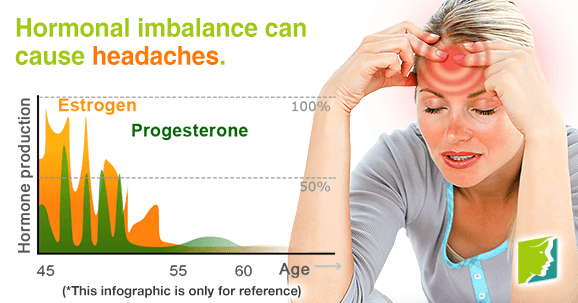During menopause, the shifts in a woman's hormone levels cause many physical alterations to occur throughout the body: the circulatory system being just one part of the body that is affected. Decreased production of testosterone, progesterone, and estrogen hormones causes activity in the bloodstream which can result in headaches and high blood pressure. These symptoms can be experienced as mild irritants, or at their worst, dangerous health hazards: (high blood pressure is a major cause of coronary heart disease (CHD).
How Do Menopausal Hormone Changes Affect the Circulatory System?
In the years preceding menopause, the body's estrogen, progesterone, and testosterone production decreases. This has numerous effects on the bloodstream as estrogen and progesterone imbalances can cause blood vessels to expand and constrict sporadically, thus triggering headaches. Decreased estrogen and testosterone levels also hinder the body's ability to metabolize sodium, which can in turn lead to high blood pressure (hypertension).
Hypertension
Hypertension refers to abnormally high blood pressure: a condition which strains the heart and blood vessels, thus increasing the risk of CHD. Often referred to as the "silent condition" hypertension can be hard to detect. Although many women will experience hypertension during menopause, those who are overweight, have a family history of high blood pressure, or diabetes are more likely to experience the condition. It is advised that any women falling into these categories consult their doctor for a cardiovascular risk assessment.
Although common, hypertension is a manageable condition. If diagnosed, your doctor can recommend specific lifestyle changes and medications based on your medical history. As a rule, however, women are advised to take regular exercise (30 minutes a day); minimize intake of salt, saturated fats, and cholesterol; and quit smoking.
Headaches
Headache experiences during menopause can range from mildly distracting to seriously debilitating. Tension headaches are the most common and can felt as dull, throbbing pains in the skull that last for around 30 minutes at a time. Migraine experiences are also not unheard of during menopause. Their symptoms include sensitivity to light and sound, nausea, vomiting, and patchy vision.
Limiting known headache triggers can help reduce their frequency and intensity. Excessive intake of alcohol or caffeine affects the blood vessels surrounding the brain and cause headaches. Eating junk and Chinese foods can be also trigger headaches, as many of these products contain monosodium glutamate (MSG). The nitrates, found in hot dogs and other processed meats, and the tyramine, found in soy products and smoked fish, might also induce headaches.
If you believe yourself to be experiencing menopause, it is wise to consult a doctor for a discussion on the experience and specific advice on managing the physical and emotional changes menopause brings. If you experience debilitating headaches or have reason to suspect that you are prone to hypertension, it is especially important to take this step.
Sources
- Better Health Channel. (2014). Headaches and Hormones. Retrieved March 13, 2014, from http://www.betterhealth.vic.gov.au/bhcv2/bhcarticles.nsf/pages/Headache_and_hormones
- Harvard Health Publications. (2013). High blood pressure a silent danger in postmenopausal women. Retrieved March 13, 2014, from http://www.health.harvard.edu/newsletters/Harvard_Womens_Health_Watch/2013/April/high-blood-pressure-a-silent-danger-in-postmenopausal-women
- Maas, A. & Franke, H.R. (2009). Women's health in menopause with a focus on hypertension. Netherlands Heart Journal, 17(2), 68-72. Retrieved from http://www.ncbi.nlm.nih.gov/pmc/articles/PMC2644382/
- National Health Service UK. (2013). Headaches. Retrieved March 13, 2014, from http://www.nhs.uk/conditions/Headache/Pages/Introduction.aspx
- National Health Service UK. (2013). Hormone headaches.Retrieved March 13, 2014, from http://www.nhs.uk/Livewell/headaches/Pages/Hormonalheadaches.aspx




